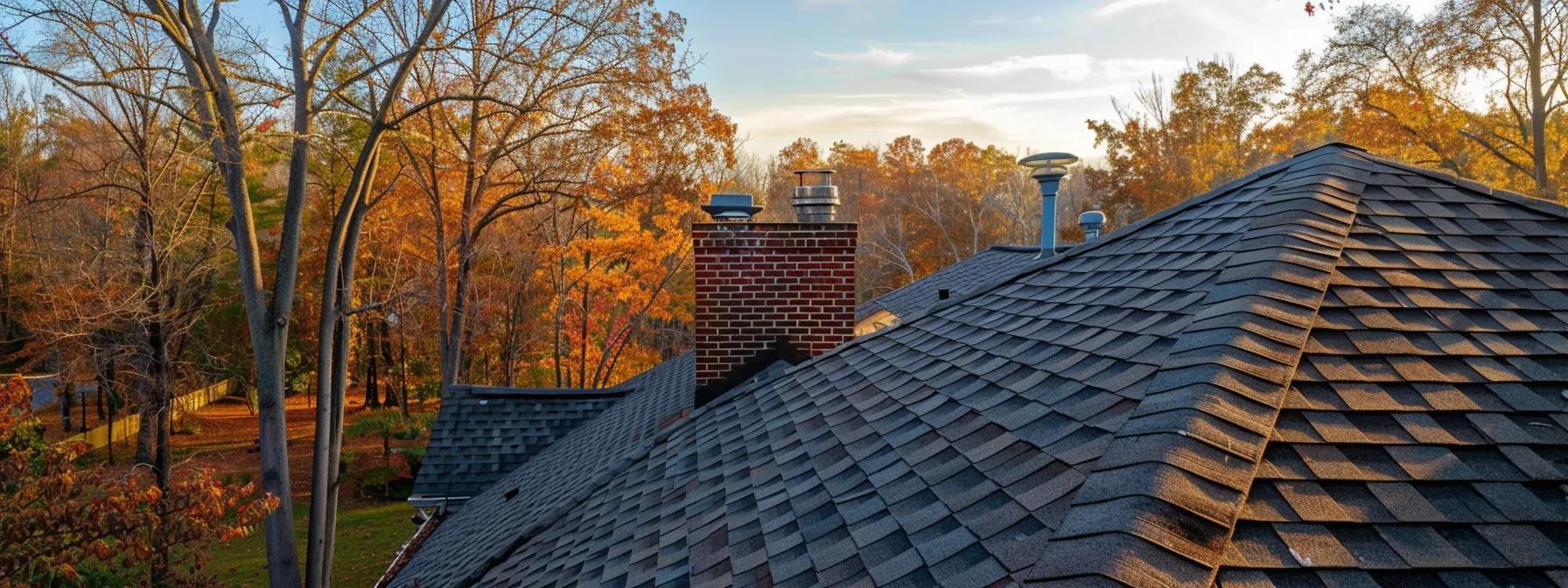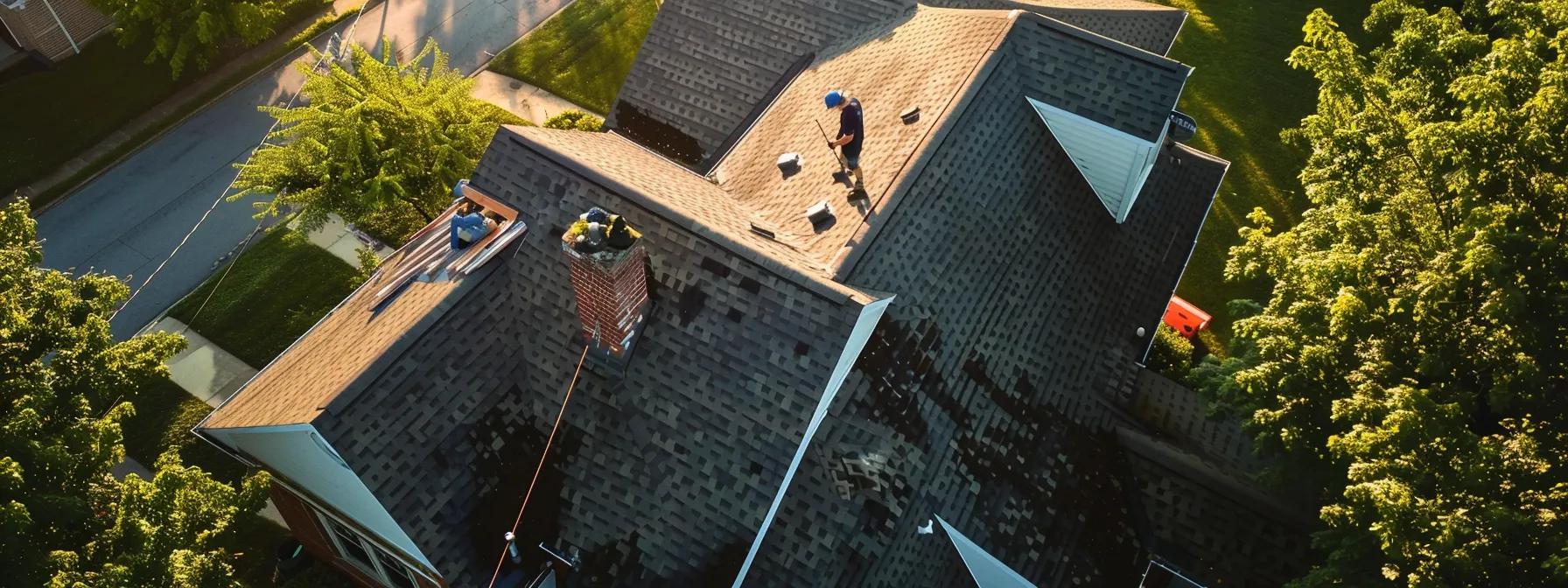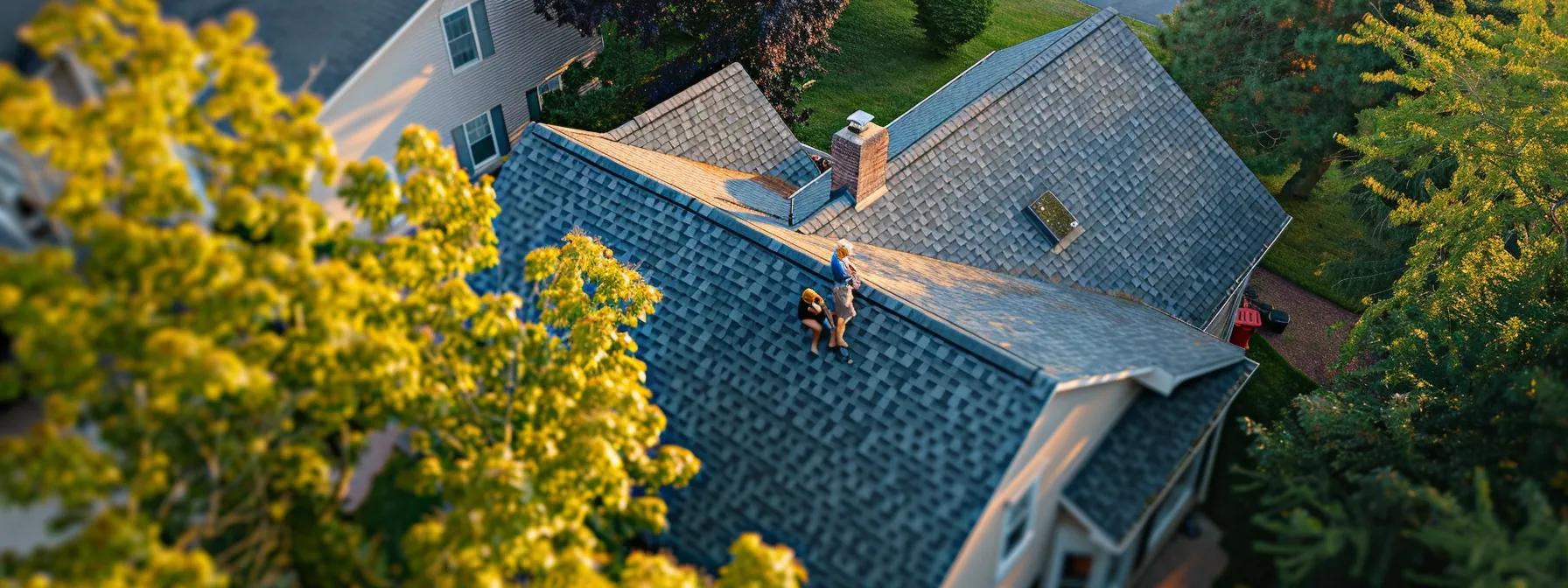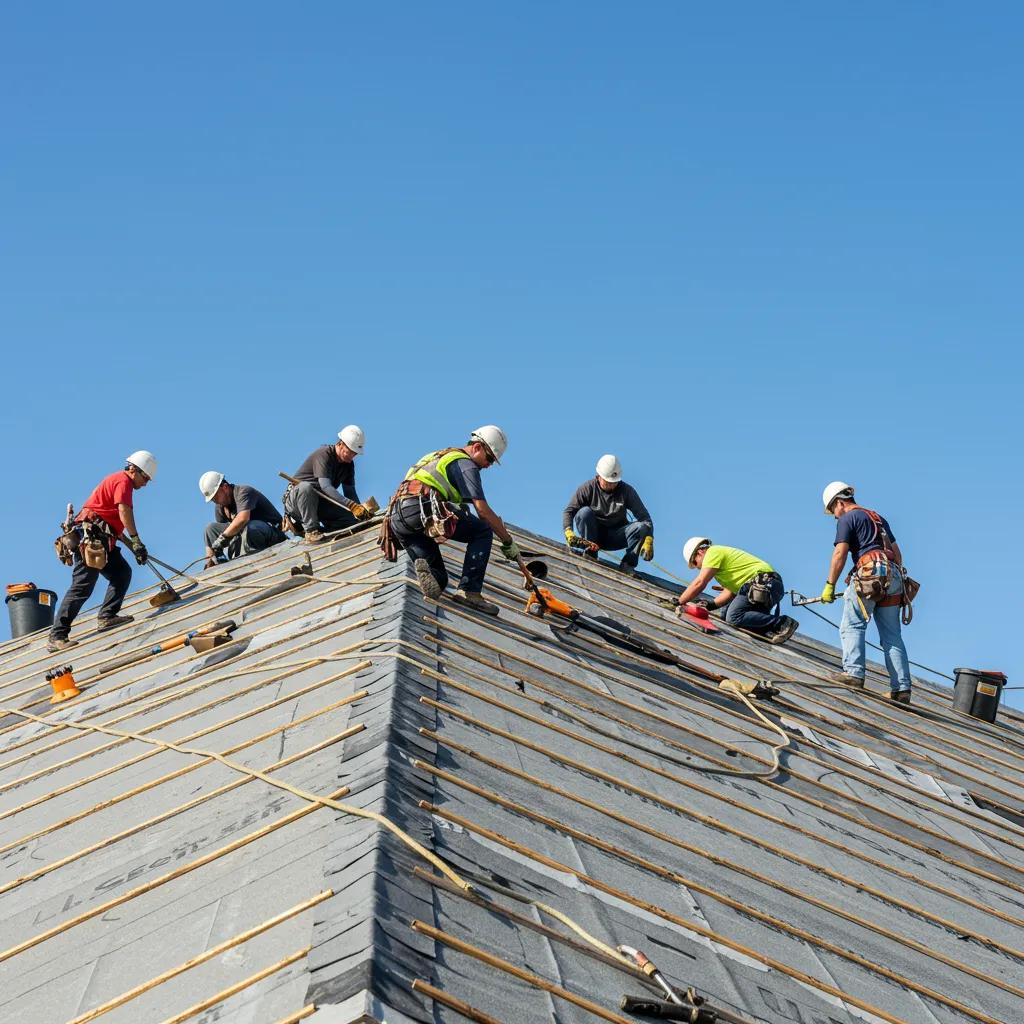
Top-Tier Commercial Roofing Services: Expert Solutions for Business Owners
A single leak can jeopardize daily operations and erode tenant trust. Our expert commercial roofing contractors provide robust roofing systems designed to protect your assets, boost energy efficiency, and minimize costly downtime. This guide delves into essential commercial roofing services, compares leading roofing materials, explains quality workmanship standards, outlines industry-specific solutions, and offers strategies for selecting the ideal contractor—all aimed at enhancing reliability and maximizing your long-term savings.
What Commercial Roofing Services Do Expert Contractors Provide?
Commercial roofing contractors offer a comprehensive suite of services engineered to secure your business properties and extend the life of your roof. By integrating inspections, repairs, replacements, ongoing maintenance, and emergency response, we address both routine upkeep and urgent needs with precision.
How Does Commercial Roof Repair Protect Your Business Property?
Commercial roof repair restores waterproofing membranes, seals punctures, and reinforces flashing to prevent water intrusion and structural compromise. Prompt repairs halt leaks before they escalate, preserving interior finishes, maintaining insulation performance, and averting mold growth. Timely interventions safeguard your equipment and prevent expensive downtime, reinforcing the integrity of your facility.
When Is Commercial Roof Replacement Necessary?
Commercial roof replacement becomes critical when extensive membrane deterioration, recurring leaks, or substrate rot threaten structural integrity. Indicators include widespread blistering, sagging sections, or insulation breakdown that cannot be resolved through repairs. A complete replacement restores load-bearing capacity, enhances energy performance, and provides a new warranty for enduring reliability.
What Are the Benefits of Regular Commercial Roof Maintenance?
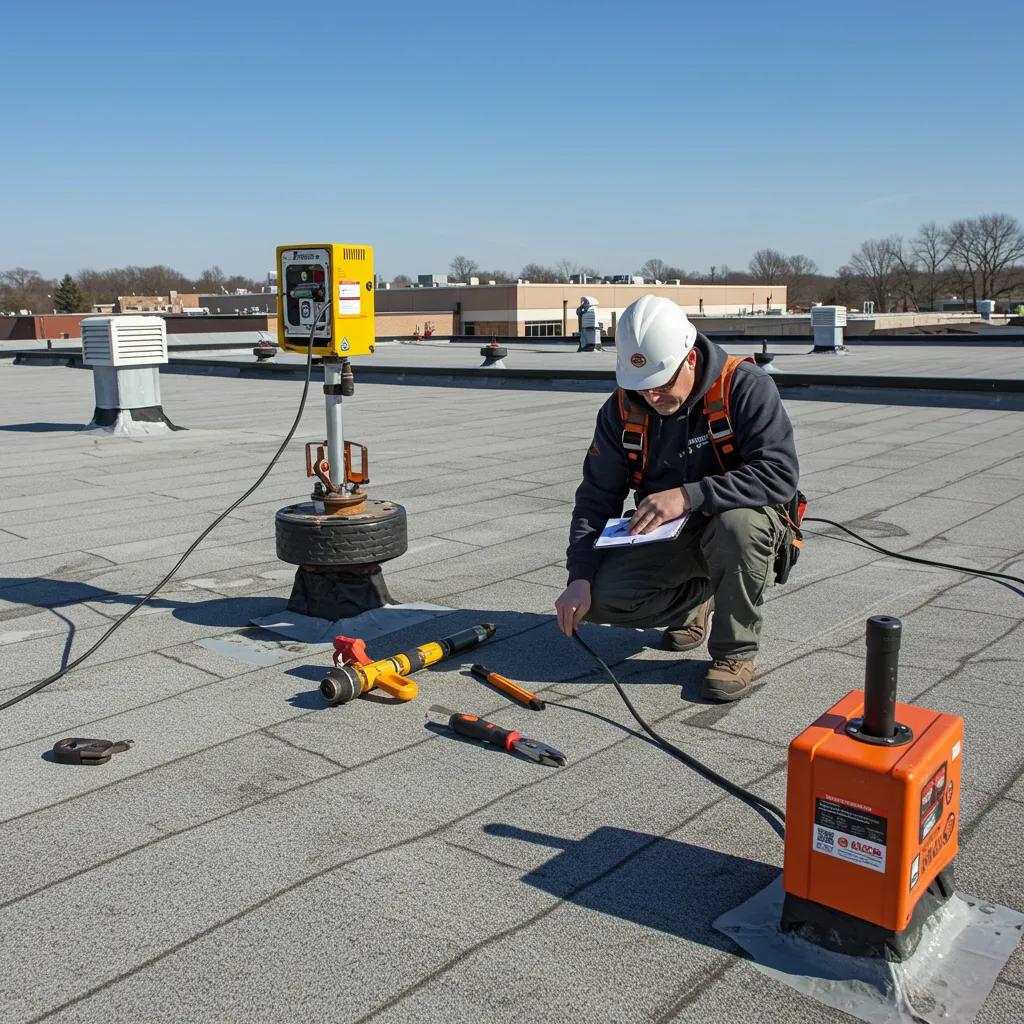
Regular maintenance involves inspecting sealants, clearing debris, and checking drainage systems, effectively preventing minor issues from escalating into major failures.
Scheduled upkeep:
- Extends roof lifespan through protective coatings and membrane reinforcement.
- Boosts energy efficiency by maintaining reflective surfaces.
- Minimizes unexpected repair expenses by identifying damage early.
Routine maintenance supports proactive asset management and ensures your warranty remains valid.
Commercial Roof Maintenance: A Proactive Approach
A 15-year study conducted by Firestone Building Products and ProLogis revealed that proactive roof maintenance costs an average of 14 cents per square foot annually, significantly less than the 25 cents per square foot for reactive maintenance. This proactive strategy also extended the average roof lifespan from 13 years to 21 years, demonstrating substantial long-term savings and reduced lifecycle costs.
This research validates the article’s emphasis on the long-term savings, extended lifespan, and reduced lifecycle expenses achieved through regular commercial roof maintenance programs.
How Do Emergency Commercial Roofing Services Work?
Emergency roofing services deploy rapid-response teams within hours of a storm or critical leak event. Our technicians provide immediate temporary tarping, conduct on-site assessments, and implement targeted repairs to stabilize the roof. This swift action halts active leaks, protects interior equipment, and transitions smoothly into permanent restoration, minimizing business disruption.
Which Commercial Roofing Materials Offer the Best Quality and Durability?
Selecting the optimal roofing material involves balancing durability, cost, and energy performance. Below is a comparative overview of leading commercial roofing systems.
Before diving into material specifics, it’s crucial to understand how each option performs in real-world conditions and supports your operational budget.
This comparison highlights that metal and PVC offer the longest service life, while EPDM remains a cost-effective choice for mid-range budgets. Understanding these trade-offs empowers you to make smarter roofing decisions.
What Are the Advantages of TPO Roofing Installation for Commercial Buildings?
TPO roofing features a single-ply membrane enhanced with reflective pigments to improve energy efficiency and reduce heat absorption. Its heat-welded seams effectively block air and moisture infiltration, and the flexible membrane adapts to temperature fluctuations without cracking. TPO’s excellent balance of durability and affordability makes it a premier choice for new installations.
How TPO Roofing Saves Energy Costs
Studies indicate that TPO roofing, recognized for its high solar reflectivity, can decrease cooling energy consumption in commercial buildings by 10–30%. This reduction is achieved by reflecting a substantial portion of the sun’s rays, which effectively lowers indoor temperatures and lessens the demand on HVAC systems, leading to considerable savings on utility bills.
This research directly supports the article’s claims regarding the energy efficiency and cost-saving benefits of reflective TPO membranes and cool-roof coatings.
How Does EPDM Rubber Roofing Compare for Commercial Use?
EPDM rubber roofing utilizes a black synthetic membrane celebrated for its weather resistance and straightforward installation. Its monolithic design effectively resists UV degradation and ponding water when properly sloped. EPDM repairs are simple, and the material delivers consistent performance for mid-sized facilities operating within a moderate budget.
Why Choose Commercial Metal Roofing for Industrial and Flat Roofs?
Commercial metal roofing provides exceptional impact resistance and superior fire protection. Standing seam panels efficiently shed water and can cover large spans with minimal seams. Metal systems can integrate insulation and reflective coatings, significantly reducing energy costs. Their extended lifespan and minimal maintenance requirements make them an ideal selection for warehouses and manufacturing plants.
What Are the Features of Modified Bitumen and PVC Roofing Solutions?
Modified bitumen roofs combine asphalt with polymers to enhance flexibility, tear resistance, and UV stability. Whether torch-applied or cold-adhesive, these options ensure secure adhesion on low-slope roofs. PVC membranes, on the other hand, excel in resisting chemicals and standing water, featuring welded seams and integrated flashing that provide robust protection against punctures and leaks in demanding environments.
How Do Expert Commercial Roofing Contractors Ensure Quality Workmanship?
Quality workmanship is achieved through skilled labor, adherence to certified procedures, and the use of premium materials to deliver enduring roofing systems. Our contractors follow industry best practices and maintain rigorous quality control throughout every phase of your project.
What Experience and Certifications Should You Look for in Commercial Roofers?
Business owners should confirm that roofing teams possess certifications from leading membrane manufacturers (e.g., TPO, EPDM, PVC suppliers) and credentials from respected trade associations like the National Roofing Contractors Association. A proven track record of successful projects and documented safety training demonstrate their capability to manage complex commercial installations.
How Do Quality Materials Impact Commercial Roof Longevity?
The use of high-grade membranes, advanced sealants, and corrosion-resistant flashing directly enhances membrane performance and prevents leaks. Premium materials retain their elasticity under extreme temperature variations and resist UV degradation, ensuring that your roofing system achieves or surpasses its rated service life.
Why Is Local Knowledge Important for Commercial Roofing in Maryland, West Virginia, and Pennsylvania?
Regional expertise ensures that contractors are well-versed in local weather patterns, building codes, and material performance under specific humidity or snowfall conditions. A local commercial roofing contractor can respond swiftly to emergencies and expertly select membrane choices—such as heat-welded TPO for southern Maryland or reinforced metal panels for Appalachian wind loads.
What Are the Best Commercial Roofing Solutions for Different Industries?
Each sector has unique roofing requirements based on building usage, traffic loads, and environmental exposures. Our contractors expertly match roofing designs to industry-specific demands.
How Are Industrial Roofing Solutions Tailored for Manufacturing Facilities?
Manufacturing roofs often contend with heavy equipment loads, overhead cranes, and potential chemical exposure. Industrial roofing solutions frequently incorporate coated metal panels or reinforced TPO membranes with enhanced impact resistance and chemical-resistant surfacing to withstand rigorous maintenance activities and overhead operations.
What Commercial Roofing Options Suit Retail and Office Buildings?
Retail and office properties prioritize aesthetic appeal, energy efficiency, and occupant comfort. Reflective TPO or PVC systems significantly improve cooling performance during warmer months, while modified bitumen with custom walk pads offers safe access for rooftop maintenance. Integrated drainage and meticulously detailed parapets maintain the building’s clean, professional facade.
How Do Flat Roof Contractors Address Unique Challenges of Low-Slope Roofs?
Specialists in low-slope roofing optimize waterproofing through multiple membrane layers, prefabricated flashings, and tapered insulation for positive drainage. They install protective surfacing and conduct regular inspections of drainage outlets, effectively preventing ponding water that can lead to membrane deterioration.
How Can Business Owners Choose the Right Commercial Roofing Contractor?
Selecting a dependable contractor involves a thorough evaluation of credentials, a clear understanding of warranties, and confirmation of service capabilities. Asking the right questions ensures you partner with a company aligned with your business objectives.
What Questions Should You Ask Before Hiring a Commercial Roofing Company?
Business owners should inquire about:
- Project Experience – “Can you share case studies relevant to my industry and region?”
- Certification Status – “Which membrane manufacturers have certified your team?”
- Safety Records – “What safety protocols and training programs are in place?”
These questions effectively reveal competence, reliability, and a commitment to delivering high-quality outcomes.
How Do Warranties and Service Guarantees Affect Your Roofing Investment?
Comprehensive warranties covering materials, workmanship, and extending up to 25–30 years protect against premature failures. Service guarantees for maintenance and emergency response ensure that any emerging issue is addressed promptly at no additional cost, safeguarding your return on investment.
Why Is Responsiveness and Local Service Critical for Commercial Roof Repairs?
Rapid local support is essential to minimize water damage following storms or membrane breaches. Contractors with strategically located area offices and dedicated response teams can resolve leaks quickly, preventing interior damage and production losses. Responsive service builds trust and reinforces our commitment to fulfilling our contractual obligations.
What Are the Cost Factors and ROI of Quality Commercial Roofing Services?
Understanding the key cost drivers and long-term savings allows businesses to budget effectively and maximize the return on their roofing investments.
How Much Does Commercial Roof Repair and Replacement Typically Cost?
Commercial roof repair costs generally range from $3 to $7 per square foot, depending on the membrane type and the extent of the damage. Full roof replacement averages $8 to $20 per square foot, influenced by material selection and insulation requirements. Site conditions and project scale also play a role in the overall investment.
Commercial Roof Replacement Costs
The cost of commercial roof repair typically ranges from $3 to $7 per square foot, while a full roof replacement can average $8 to $20 per square foot. These costs are influenced by various factors, including the specific roofing material chosen, the extent of the damage, the complexity of the project, and local labor rates.
This information provides verified cost ranges for commercial roof repair and replacement, supporting the financial details presented in the article.
What Long-Term Savings Come From Energy-Efficient Roofing Materials?
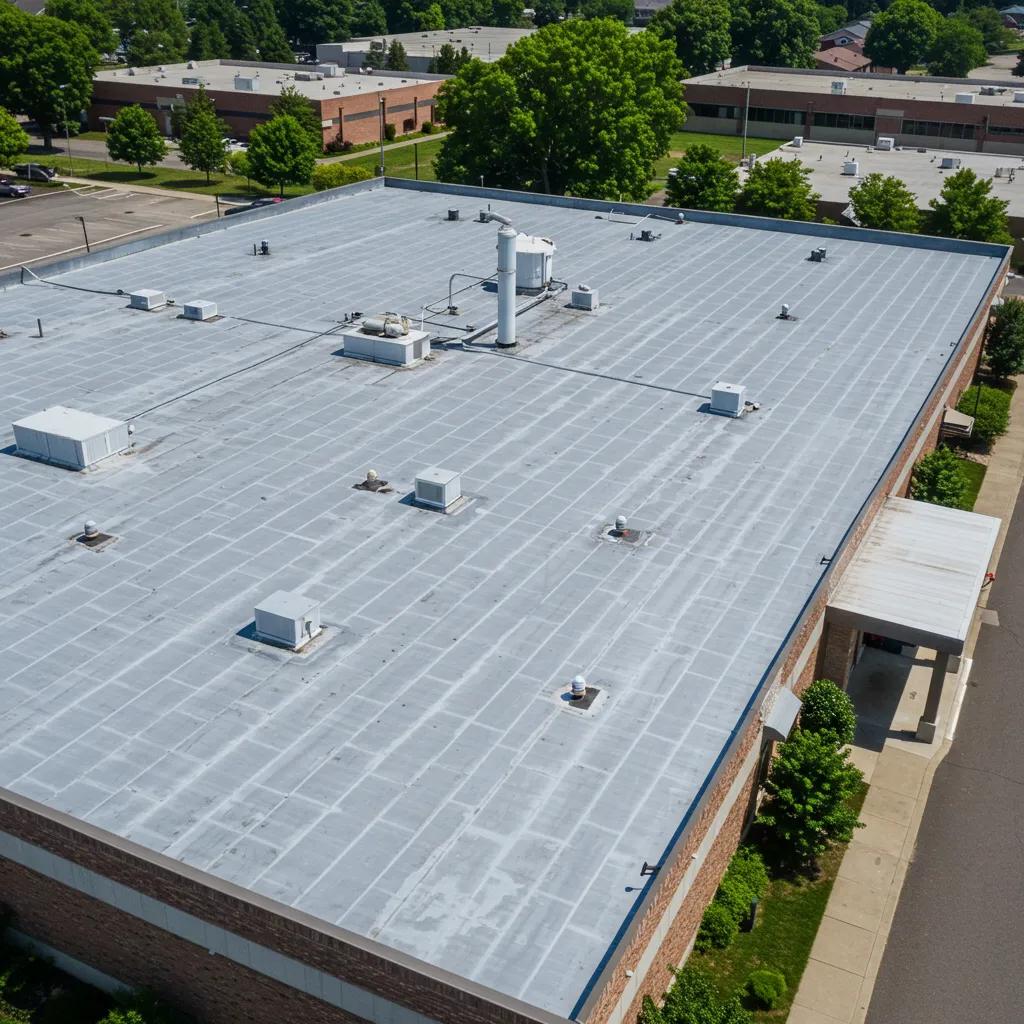
Reflective membranes like TPO and cool-roof coatings can reduce cooling energy consumption by up to 25%, leading to significant annual savings on utility bills. Over a 20-year lifespan, these energy cost reductions can offset 15–30% of the initial installation expenses, thereby improving payback periods.
How Do Maintenance Programs Reduce Overall Commercial Roofing Expenses?
Maintenance programs, which include biannual inspections, minor repairs, and membrane recoating, can extend a roof’s service life by 5–10 years. This proactive strategy significantly lowers emergency repair costs and defers the need for full replacement, reducing overall lifecycle expenses by as much as 40%.
What Are the Latest Trends in Commercial Roofing for Energy Efficiency and Sustainability?
Recent advancements in roofing technology focus on enhancing environmental performance and ensuring regulatory compliance. Businesses are adopting innovative systems to reduce their carbon footprints and capitalize on available incentives.
How Do Green and Cool Roofs Benefit Commercial Properties?
Green roofs incorporate vegetation layers that provide natural insulation, effectively manage stormwater runoff, and improve local air quality. Cool roofs utilize reflective coatings or light-colored membranes to deflect solar heat, lowering rooftop temperatures and reducing the strain on HVAC systems.
What Role Do Solar-Ready Roofing Systems Play in Commercial Roofing?
Solar-ready systems are designed with integrated mounting rails and reinforced membranes capable of supporting photovoltaic arrays without compromising waterproofing integrity. Partnering your roofing with Solar Panel Installation Services streamlines upgrades for energy generation and maximizes the potential of roof-mounted solar capacity.
How Are Advanced Materials Improving Commercial Roof Performance?
Next-generation membranes are now incorporating nanocomposite coatings for self-cleaning capabilities, antimicrobial additives to prevent mold growth, and enhanced UV stabilizers for extended service life. These innovations reduce the frequency of maintenance required and deliver predictable, long-term performance outcomes.
Expert commercial roofing contractors expertly combine proven methodologies, certified materials, and deep local knowledge to deliver reliable, long-lasting roofing systems. By thoroughly understanding service offerings, material options, workmanship standards, and cost factors, business owners can make informed decisions that effectively protect their assets and optimize their budgets. Whether you’re considering an upgrade to energy-efficient TPO, integrating solar-ready solutions, or establishing a preventative maintenance plan, partnering with a qualified contractor ensures durable protection and invaluable peace of mind. To explore tailored commercial roofing solutions designed for your business, visit our Commercial Roofing Services page and request a detailed consultation today.

